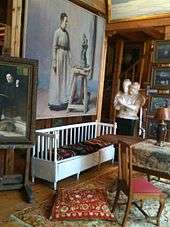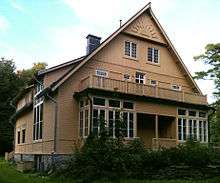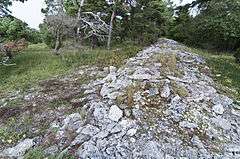Brucebo
| Brucebo | |
|---|---|
|
The hill fort in Brucebo nature reserve | |
| Location | Själsö, Väskinde, Gotland |
| Nearest city | Visby |
| Coordinates | 57°41′5″N 18°20′52″E / 57.68472°N 18.34778°ECoordinates: 57°41′5″N 18°20′52″E / 57.68472°N 18.34778°E |
| Area | 35 ha (0.35 km2)[1] |
| Created | 1970 |
| Operated by | Gotland County |
| Open | All year |
| Designation | Natura 2000 |
Brucebo is an artists estate in Själsö, Väskinde on Gotland, Sweden, created by William Blair Bruce and his wife Carolina Benedicks-Bruce. The estate later became a nature reserve and an art museum managed by the Brucebo Foundation. The Bruce and Benedicks legacy also includes the Brucebo Fine Art Scholarship for young Canadian artists.
In 2008, a shooting occurred at Brucebo in connection with establishing the museum.
The estate

Brucebo was originally a summer house bought by William Blair Bruce and his wife Carolina Benedicks-Bruce. The estate is situated 8 km (5.0 mi) north of Visby on Gotland, Sweden.[2] In 1900–06, the couple added a large extension to the small main house on the estate. The house was built in the neo-romantic style of the early 1900s.[3] The new part of the house included a studio with large windows facing the sea. The idea behind the design of the house was to eliminate the line between the outdoors and the indoors.[4] The couple created many artistic works at Brucebo and many of them can still be seen there, since the house has been converted into an art museum. The house and the museum are maintained and owned by the Brucebo Foundation.[2]
The estate is 35 ha (0.35 km2).[1] In addition to the main house there are several buildings, most of which were constructed during 1900–06, when the extension to the main house was built. There is a pavilion, a forest studio, a beach studio, the Caretaker's House, a stable with an additional shed and an ice cellar made of limestone. The buildings are designed in the same style as the main house, except for the Caretaker's House, which is inspired by one of the houses at Standgatan in Visby, the Burmeister 4.[2]
History
In her will, Benedicks-Bruce, left Brucebo to a scholarship fund that would enable young Canadian and Swedish artists to come and stay at Brucebo. However, this program did not start until after a major renovation of the house a few years after her death. The estate served as a boardinghouse for artists for a while up until 1970, when it was designated a nature reserve. The Gotland Municipality owned Brucebo between 1971 and 1973.[2]
In 1973, Brucebo was sold to Swedish TV-producer and director Torbjörn Axelman (born 1932)[5] who started to renovate the main house and the estate. When Axelman's company went bankrupt in 1995, the Brucebo Foundation bought back the estate and Axelman stayed on as a tenant in the old part of the main house.[6] With the foundation as owner, renovations were done at the house and plans to convert it to a museum were set in motion.[7]
Museum

In 2009, work began to convert the main house in Brucebo into a museum. The project was managed by the Brucebo Foundation. The house was cleaned, the original furniture was renovated and the art, comprising thousands of works, was brought to the Gotland Museum to be catalogued and restored. Everything was later brought back to the house and the ground floor was arranged in exactly the same way it had been when Bruce and Benedicks-Bruce lived there.[8][3] The museum opened in 2012, and is open for pre-booked groups of visitors.[6]
Nature reserve
In 1970,[2] the Brucebo estate was established as a nature reserve.[9] The Brucebo nature reserve is mainly located in Visby, a minor part of it belongs to Väskinde socken. It is described as a "miniature Gotland" since all the different kinds of landscapes on the island are represented there. In 2005, it was designated as a Natura 2000 area.[2]
The reserve is directly south of the museum and includes the Skansudd bird reserve and the cliff to its east, with a 100 by 60 m (330 by 200 ft) hill fort on the crest. The north and west sides of the fort are protected by steep slopes while the south and west sides have an embankment 92 m (302 ft) long, 3 m (9.8 ft) wide and 0.5 m (1.6 ft) high.[10]
The crest of the cliff, where the limestone is bare, is a habitat for Cerastium pumilum, Cerastium semidecandrum, Potentilla neumanniana, Veronica spicata, Scabiosa columbaria and Pilosella peleteriana. Nearby, can be found stands of Artemisia rupestris, Sorbus rupicola, Cotoneaster niger, elderberry, Rosa mollis and sweet briar. There are grape vines and mahaleb cherrys, probably from seeds carried by birds, growing on a barrow near the hill fort. The area below the cliff is forested with firs and deciduous trees entwined with ivy. A number of rare and endangered species of funi have also been registered in the reserve.[11]
In the drop of the cliff is a small cave called the Brucebo Cave, where relics from an Iron Age settlement have been found.[12]
Brucebo Foundation
In 1972, the estate of Carolina Benedicks-Bruce created the Brucebo Fine Art Scolarship Foundation. The scholarship is given to younger Canadian artists, to come an stay, work and study at Brucebo on Gotland.[13]
Scholarship recipients
Summer Residency and Travel Scholarship.[14]
- 1999, G. Scott MacLeod
- 2000, --
- 2001, Eva Richardson, Laurel Smith
- 2002, Andrew Rucklidge, Yechel Gagnon
- 2003, Keer Tanchak
- 2004, Allison Katz, Alex Bartosik
- 2005, Alexandre Masino, Andrea Vander Kooij
- 2006, Natasha Mazurka, Geneviève Chevalier
- 2007, Francois Saint-Pierre, Allison Freeman
- 2008, Mark Prier, Josée Pedneault
- 2009, Amy Schissel, Elisabeth Belliveau
- 2010, Kristen Bjornerud, Andrew Morrow
- 2011, Daniel Hutchinson, Jessica Auer
- 2012, Véronique La Perrière, Rilla Marshall
- 2013, Sara A. Tremblay, Michael Dudeck
- 2014, Daniel Paterson, Jim Holyoak
- 2015, Jeremy Herndl, Liz Toohey-Weise
Brucebo shooting
In 2008, the Brucebo Foundation's work with converting Brucebo into a museum started. The whole house was to be renovated and the previous owner, now tenant, Torbjörn Axelman was dismissed from his apartment in the main house in October that year. Axelman refused to accept this and held the chairman of the foundation, Joakim Hansson personally responsible for the decision.[7]
On 1 December 2008, Hansson, his assistants and helpers arrived with a moving truck at Brucebo to collect the old furniture and the art and transport them to the Gotland Museum for restoration and cataloguing.[7] Axelman resented this and at approximately 2:00 pm he pulled out a gun and shot Hansson three times, twice in the back and once in one of his hands.[15] Hansson and two other persons managed to flee from the house out into the garden and three other persons, who were in the house, hid out on a balcony on the top floor.[16]
When the local police came to Brucebo, they could not get Axelman to come out of the house. A team from the National Task Force were flown in from Stockholm. The police surrounded the house and at about 9:00 pm, they managed to bring Hansson and the rest of the personnel outside the house and on the balcony, to safety.[16] Hansson was brought to hospital where his condition was declared as not critical.[15] Shortly after 10:00 pm, Axelman came out of the house with a gun in his hand and started to shoot at the policemen, who returned fire and shot Axelman once in each thigh and once in the chest.[16] Axelman was arrested and taken to hospital.[17] He had lost a lot of blood and was treated for severe injuries.[16]
On 5 February 2009, Axelman was found guilty by the Gotland district court, of three charges of attempted murder.[18] According to the Swedish National Board of Forensic Medicine, Axelman suffered from a severe mental disorder and in need of psychiatric treatment.[19] The district court's sentence was established by the Svea Court of Appeal on 10 June 2010.[20] He was sentenced to psychiatric care at a closed institution.[21] In October 2011, Axelman was moved from closed to open care, with a restriction that he was forbidden to visit Gotland. In March 2012, he was released from care and the restriction was lifted.[22]
See also
References
- 1 2 "Brucebo naturreservat" [Brucebo nature reserve] (PDF). www.lansstyrelsen.se (in Swedish). The County Administrative Boards of Gotland County. Retrieved 11 July 2015.
- 1 2 3 4 5 6 Svännel, Jessica. "Vårdprogram för trädgården på Brucebo" (PDF). www.jessicasvannel.se. Swedish University of Agricultural Sciences. Retrieved 11 July 2015.
- 1 2 Molin, Maria (17 July 2014). "Att fånga Brucebos ljus" [To capture Brucebo's light]. www.gotland.net (in Swedish). Gotlands Media AB. Retrieved 12 July 2015.
- ↑ Ödin, Hanne (1990). Caroline Benedicks Bruce : skulptris och akvarellist [Caroline Benedicks Bruce : sculptor and water color painter] (in Swedish). Visby: Gotland Museum.
- ↑ "Torbjörn Axelman". www.ne.se. Nationalencyklopedin. Retrieved 14 July 2015.
- 1 2 Olsson, Magdalena (16 April 2011). "Här vill hustomtar öppna museum" [Housekeepers to open museum]. www.helagotland.se (in Swedish). Helagotland. Retrieved 13 July 2015.
- 1 2 3 Leino, Per (2 December 2008). "All ilska riktades mot ordföranden" [All anger was directed at the chairman]. www.helagotland.se (in Swedish). Helagotland.se. Retrieved 13 July 2015.
- ↑ "Så blir nya Brucebo" [This is the new Brucebo]. www.sverigesradio.se (in Swedish). Sveriges Radio. 12 October 2009. Retrieved 13 July 2015.
- ↑ "En William Blair kommer hem" [A William Blair comes home]. www.lansstyrelsen.se (in Swedish). The County Administrative Boards of Gotland County. 8 April 2011. Retrieved 14 July 2015.
- ↑ "RAÄ-nummer Visby 26:1". www.raa.se (in Swedish). Swedish National Heritage Board. Retrieved 11 July 2015.
- ↑ Petersson, Jörgen; Ingmansson, Gun; Mossberg, Bo (2007). Gotlands Flora – en guide [Plants of Gotland – a guide] (in Swedish). Visby: Gotlands botaniska förening. pp. 219–222. ISBN 978-91-977015-0-1.
- ↑ "RAÄ-nummer Väskinde 133:1". www.raa.se (in Swedish). Swedish National Heritage Board. Retrieved 11 July 2015.
- ↑ "Brucebo and W.B. Bruce Fine Art Scholarships for Canadian Artists". www.swedenabroad.com. Embassy of Sweden, Ottawa. Retrieved 14 July 2015.
- ↑ "Past Recipents [sic]". www.bruceboscholarshipsc.ipage.com. Brucebo Foundation. Retrieved 13 July 2015.
- 1 2 Rydenholm, Per (2 December 2008). "Tragiskt att polisen tvingas använda skjutvapen" [Tragic when the police have to use guns]. www.helagotland.se (in Swedish). Helagotland. Retrieved 14 July 2015.
- 1 2 3 4 Hellsten, Johanna (2 December 2008). "Sköts med tre skott" [Shot with three shots]. www.aftonbladet.se (in Swedish). Aftonbladet. Retrieved 14 July 2015.
- ↑ "Mannen gripen – förd till lasarettet" [Man arrested - taken to hospital]. www.helagotland.se (in Swedish). Helagotland. 1 December 2008. Retrieved 14 July 2015.
- ↑ Leino, Per (5 February 2009). "Axelman fälldes för tre mordförsök" [Axelman convicted for three attembted murders]. www.helagotland.se (in Swedish). Helagotland. Retrieved 14 July 2015.
- ↑ "Axelman var psykiskt sjuk" [Axelman had a mental disorder]. www.sverigesradio.se (in Swedish). Sveriges Radio. 25 March 2009. Retrieved 14 July 2015.
- ↑ Rydenholm, Pär (9 June 2010). "Hovrätten fastställde Axelmans dom" [Court of Appeal establish Axelman's sentence]. www.helagotland.se (in Swedish). Helagotland. Retrieved 14 July 2015.
- ↑ "Dom för Bruceboskott står fast" [Sentence for Brucebo shooting stands]. www.sverigesradio.se (in Swedish). Sveriges Radio. 10 June 2009. Retrieved 14 July 2015.
- ↑ Leino, Per (7 April 2012). "Torbjörn Axelman är nu en fri man" [Torbjörn Axelman is a free man]. www.helagotland.se (in Swedish). Helagotland. Retrieved 14 July 2015.
Further reading
- Bruce, William Blair; Murray, Joan (1982). Letters home, 1859–1906: the letters of William Blair Bruce. Penumbra Press. ISBN 978-0-920806-36-4.
External links
| Wikimedia Commons has media related to Brucebo. |
- Maps, pictures and a presentation of Brucebo (in Swedish)
